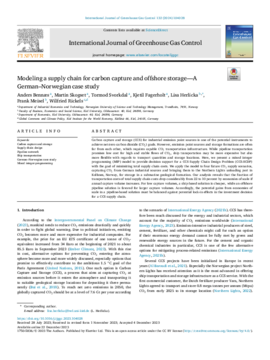Journal Article
Modeling a supply chain for carbon capture and offshore storage—A German–Norwegian case study
Autoren
Erscheinungsdatum
DOI
10.1016/j.ijggc.2023.104028
Schlagworte
Klima
Carbon capture and storage (CCS) for industrial emission point sources is one of the potential instruments to achieve net-zero carbon dioxide (CO2) goals. However, emission point sources and storage formations are often far from each other, which requires capable CO2 transportation infrastructure. While pipeline transportation promises low cost for high and stable flows of CO2, ship transportation may be more expensive but also more flexible with regards to transport quantities and storage locations. Here, we present a mixed integer programming (MIP) model to provide decision support for a CCS Supply Chain Design Problem (CCS-SCDP) with the goal of minimizing total supply chain costs. We apply the model to four future CO2 supply scenarios, capturing CO2 from German industrial sources and bringing them to the Northern Lights unloading port in Kollsnes, Norway, for storage in a submarine geological formation. Our analysis reveals that the fraction of transportation costs of total supply chain costs drop considerably from 22 to 10 percent by economies of scale if annual capture volume increases. For low capture volumes, a ship-based solution is cheaper, while an offshore pipeline solution is favored for larger capture volumes. Accordingly, the potential gains from economies of scale in a pipeline-based solution must be balanced against potential lock-in effects in the investment decision for a CCS supply chain.





